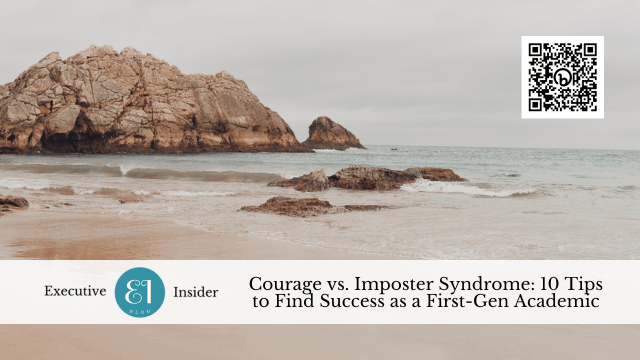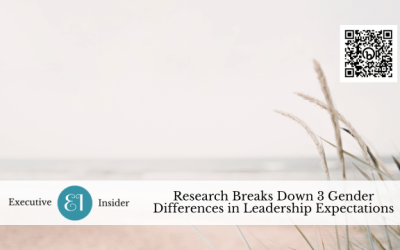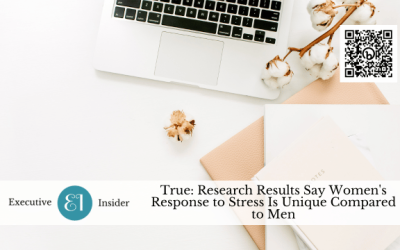You’ve already come so far as a first-generation professional. Being the first in your family to pursue an advanced degree is an incredible accomplishment. Yet as you navigate academia, you may sometimes feel like an outsider or fraud just waiting to be exposed.
This nagging self-doubt is known as imposter syndrome, and it’s incredibly common among high-achievers from underrepresented backgrounds. Studies indicate that people from marginalized ethnic or socioeconomic groups are more likely to experience imposter syndrome. 1
You’re Not Alone
Even hugely successful women at the pinnacle of academia share that they grapple with imposter syndrome.
One example is Maryam Mirzakhani, the only woman to ever win the prestigious Fields Medal in mathematics. Early in her career, she struggled with the fact that her work didn’t come as quickly or easily as her peers. She later realized that “slow progress is ok, small steps are ok”. 2
Melissa Franklin, the first tenured female physicist at Harvard, has also candidly discussed feelings of intellectual phoniness and difficulties embracing her expertise. In an interview, she stated:
“I was the first tenured woman in the physics department, and I was scared to death for years that people would find out I’m not as good as they think I am”. 3
As a first-generation professional, you might feel this imposter syndrome even more acutely. But it doesn’t have to hold you back from a fulfilling academic career. With the right mindset shifts and strategies, you can move past self-doubt and own your seat at the table.
10 Tips to Manage Imposter Syndrome
Here are some practical tips to start silencing, or managing, that inner critic:
-
- Open up to trusted mentors and colleagues. Knowing you’re not alone in feeling this way can be incredibly validating. And they may be able to share how they overcame similar doubts.
- Celebrate your wins, both big and small. Note each publication, grant secured, award received — anything that affirms your abilities.
- Focus on adding value, not seeking validation. How can you help students and peers rather than fixating on what they think?
- Remember people see strengths in you that you can’t. Our own self-perception is often distorted.
- Create an “accomplishment resume.” List everything you’ve achieved to prove imposter syndrome wrong. Refer to it when you need a confidence boost.
- Open up to trusted mentors and colleagues. Knowing you’re not alone in feeling this way can be incredibly validating. And they may be able to share how they overcame similar doubts.
Women Underestimate Their Excellence
It’s not just in your head. Research indicates women consistently underestimate their abilities and performance.
In one study, when men and women were asked to evaluate their own scientific conference abstracts, women gave themselves lower scores despite both genders being rated equally by independent reviewers. 5
Here are the rest of the 10 tips to counter your self-doubt and build your self-confidence:
-
- Own your expertise. You have every right to weigh in on subjects you’ve studied extensively. Don’t discount your knowledge.
- Separate feedback on work from your self-worth. Critiques aren’t personal attacks. They help produce stronger research.
- View networking as relationship-building, not self-promotion. Focus on mutual interests and potential collaborations.
- Be your own advocate. Take credit for achievements. Promote projects showcasing your talents.
- Remember intelligence isn’t fixed. It can be continually developed through effort and experience. Neuroscience reveals our brains are malleable throughout life. 6
- Own your expertise. You have every right to weigh in on subjects you’ve studied extensively. Don’t discount your knowledge.
With time, these practices can transform imposter syndrome into earned confidence. You have every right to be in the spaces you’ve worked so hard to reach. Rather than just surviving, you can truly thrive in academia by embracing your unique experiences as assets. Your distinct perspective and voice enrich the academic community.
You already have the inner drive and resilience. Now it’s time to boldly take up space and bring your invaluable contributions to the table.
At Executive Insider, we know the power first-gen voices hold. We also understand the inner critics holding you back. Our community helps you own your worth and navigate hurdles with grace. Don’t do this alone. Become a NexGen Trailblazer, and see what we have to offer. You even have 7 days to check it out and get your money back in full, if you’re not satisfied during that time. May and I would love the chance to support you in your journey!
Sources
- Peteet, B.J., Montgomery, L., & Weekes, J.C. (2015). Predictors of imposter phenomenon among talented ethnic minority undergraduate students. The Journal of Negro Education, 84(2), 175-186.
- Castelvecchi, D. (2014). Mathematician Maryam Mirzakhani wins Fields medal. Nature.
- Joffe, M. (2007). Melissas Story: Reflections on impostor syndrome. Philosophical Psychology.
- Zell, E., Strickhouser, J.E., Lane, T.N., & Teeter, S.R. (2016). Mars, Venus, or Earth? Sexism and the exaggeration of psychological gender differences. Sex Roles.
- Schmader, T., Whitehead, J., & Wysocki, V. H. (2007). A linguistic comparison of letters of recommendation for male and female chemistry and biochemistry job applicants. Sex Roles, 57(7-8), 509-514.
- Davidson, R. J., & Begley, S. (2012). The emotional life of your brain. Hudson Street Press.






